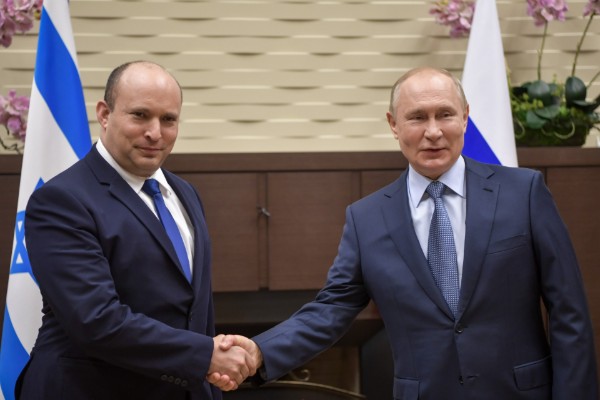In his first interview since leaving office, the former prime minister talked of his mediation efforts to try and arrange a Russia-Ukraine ceasefire in the early days of the war.
By Batya Jerenberg, World Israel News
In his first interview since leaving office, former prime minister Naftali Bennett told Channel 12 that in his short-lived mediation effort after the Russia-Ukraine war began, he had received the important assurance from Russian President Vladimir Putin that he would not try to assassinate Ukraine’s leader.
“In the meeting, Putin made two huge concessions,” he told interviewer Hanoch Daum.
One was letting go of the condition of the complete demilitarization of Ukraine. The other was that “He gave up on denazification, which meant assassinating [President Volodymyr] Zelensky. That’s the most precious thing, the life of a leader [and] he was living in a bunker where nobody knew where he was.”
“At some point, three or four hours into the meeting, I said to Putin, “Listen, what’s the story here? Do you intend to kill [him]?’ and he said, ‘I won’t kill Zelensky.’ I told him, ‘I need to understand that you’re giving me your word that you will not kill Zelensky,’ and he repeated, ‘I’m not going to kill Zelensky.’”
This was not necessarily a simple promise to make for the Russian leader, because one of his main stated reasons for invading Ukraine was that the country was being ruled by fascists, which made it not only a danger to Russia but to the world. Invoking the Nazis repeatedly before the February 24 invasion made his military move acceptable to many in his country, since, as Bennett explained, the fight against Germany in what Russians call “The Great Patriotic War,” is “at the heart of the Russian ethos, and especially with Putin.”
Some two months earlier, in what was still only a tense time with Russian buildup at the border with Ukraine, Bennett had gone to Sochi to meet Putin for the first time. He recalled that that they had discussed over several hours a myriad of topics in a very convivial way, and understandings were reached, especially regarding Israeli freedom of action in Syria.
Yet, when he asked the Russian leader if he would meet with Zelensky – a request he said Zelensky had asked him to make two days before his trip – Bennett said Putin’s friendly face suddenly went cold.
“These are Nazis, they are warmongers, I won’t meet him,” he said, quoting Putin.
Bennett said that while still on the way to the airport from April’s emergency meeting, he had called the Ukrainian leader and told him what Putin had said.
“I’ve just come out of a meeting, he is not going to kill you,” Bennett said he told Zelensky. “He asked me, ‘Are you sure?’ I said, ‘One hundred percent. He’s not going to kill you.’ Two hours later, Zelensky went back to his office and made a selfie video where he said, ‘I’m not afraid.’”
Zelensky also made an enormous concession that same day, Bennett noted, backing away from his desire to bring his country into NATO.
Having the Western military alliance literally on Russia’s doorstep had been an absolute red line for Putin, who considered it a violation of an understanding he had with the West after the Berlin Wall fell that his country’s “enemy, or rival” would not ensconce itself in “Russia’s backyard,” Bennett said.
The former prime minister said that it had originally been Zelensky’s idea for him to try to mediate between the sides after the invasion began.
He agreed, he said, because “I knew that the connection I had made with Putin, the bond of trust, was a relatively rare commodity,” he said, noting that perhaps President Erdogan of Turkey was another possibility, but that the Americans “didn’t know how to talk” to Russia in those days “or today.” He called the Americans and told them he could be “a pipeline.”
He emphasized that he had gone that April for his lightning trip in complete coordination with the U.S., and that in the many subsequent “back and forth telephone conversations” he had with both Putin and Zelensky to try to construct a ceasefire, he “did not take a step” without the knowledge of the American, French, British and German leaders.
“I tried to find solutions,” he said, in these negotiations, as “I am relatively very experienced in negotiations, from back in my business days and in politics and I know how to do deals.”
“Did you think you had a chance of succeeding?” Daum asked him.
“I have an argument with the Americans over this,” Bennett answered with a smile. “I think there was a chance…and they said there hadn’t been a chance.”
In the event, nothing came of his efforts, as the war’s first anniversary approaches in less than three weeks.





